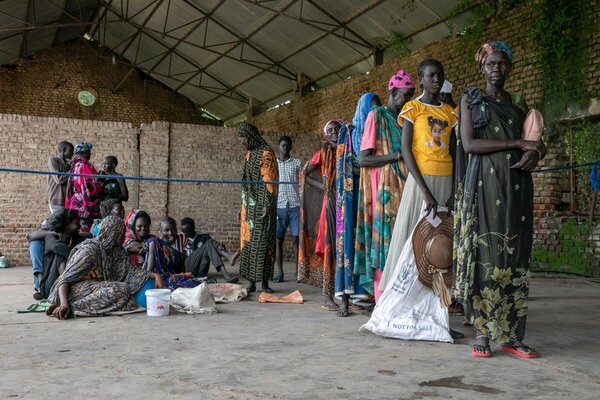'Fleeing danger, finding despair': hunger emergency looms for South Sudanese fleeing conflict in Sudan, warns WFP
Almost all of those who have crossed the border since fighting broke out in Sudan in mid-April are South Sudanese and they are returning to a country already facing unprecedented humanitarian needs. A new food security assessment completed by WFP shows that 90 percent of returnee families are experiencing moderate or severe food insecurity. Screening data from the border crossing found that almost 20 percent of children under five and more than a quarter of pregnant and breastfeeding women are malnourished.
“We are seeing families leave one disaster for another as they flee danger in Sudan only to find despair in South Sudan,” says Mary-Ellen McGroarty, WFP’s Country Director in South Sudan. “The humanitarian situation for returnees is unacceptable and WFP is struggling to meet the mounting humanitarian needs at the border. We simply do not have the resources to provide life-saving assistance to those who need it most.”
The rainy season has made conditions at crowded transit centres and border crossings even more difficult, with flooding worsening food insecurity and contributing to the spread of disease. Many families report being robbed and experiencing violence as they escaped the war in Sudan and are crossing the border to South Sudan with nothing but the clothes on their backs. Those arriving today are in an even more vulnerable condition than families that fled in the early weeks of the conflict.
WFP is providing food assistance to meet the immediate needs of the families at the border, delivering hot meals, high-energy biscuits, dry rations, and cash-based transfers, as well as providing specialized nutrition support for children and mothers.
But WFP urgently requires more than US$120 million to increase support for people fleeing Sudan’s war into South Sudan over the next few months. Significant resources are also needed to help people move onwards from the crowded border area and to support them as they rebuild their lives in South Sudan, a country many of the returnees have never actually lived in.
Across South Sudan, WFP has a funding gap of US$536 million over the next six months and was only able to reach 40 per cent of food insecure people with food assistance in 2023. Those who are receiving assistance only receive half rations due to funding shortfalls which is further entrenching food insecurity.
Notes for the editor:
Photos are available here
Broadcast quality footage available here
# # #
The United Nations World Food Programme is the world’s largest humanitarian organization saving lives in emergencies and using food assistance to build a pathway to peace, stability and prosperity for people recovering from conflict, disasters and the impact of climate change.
Follow us on Twitter @wfp_media @wfp_SouthSudan @wfp_africa



